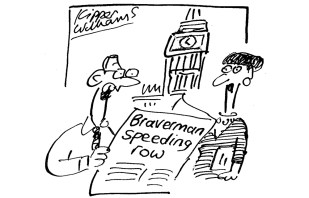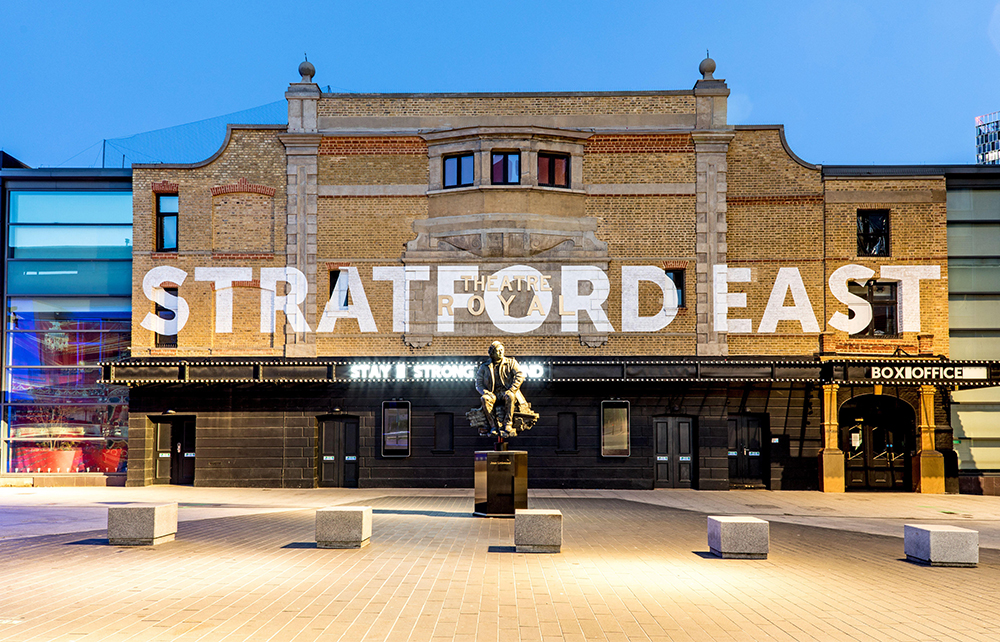Iam on the horns of a dilemma, I am in a moral quandary. I had intended to spend this morning reporting a hate crime to the Metropolitan Police regarding the Theatre Royal Stratford East and the forthcoming appearance by a duo called Tambo & Bones. According to the blurb, this performance invites the audience to ‘join their journey from comedy double-act, to hip-hop superstars, to activists in an America at the epicentre of the global Black Lives Matter movement’. And therein lies my problem, because – if I am being honest – I would rather have my wisdom teeth extracted without anaesthetic by Helen Keller than join Tambo & Bones on their remarkable journey. As a
consequence, my complaint to the Old Bill might be considered hypocritical and I would be another one of those tiresome people getting offended at something which I had no real intention of witnessing. A meddlesome busybody, in other words.
If I were to put on a play and said that I only wanted white people to see it, I would be in big trouble
That a hate crime has been committed is beyond all reasonable doubt. The theatre is scheduling a ‘black out’ production by the Americans, which is a viewing from which white people are dissuaded from attending. Hedging its bets a little, the theatre says that while nobody is actually officially excluded from the performance, they hope for an evening where an ‘all black-identifying’ audience can enjoy and discuss the performance ‘free from the white gaze’. The director Matthew Xia explained: ‘I felt that with a play like Tambo & Bones, which unpicks the complexity of Black performance in relation to the white gaze, it was imperative that we created such a space.’
Now, if I were to put on a play – perhaps my adaptation of Ayn Rand’s The Fountainhead – and said that I only wanted white people to see it, I would be in big trouble and probably out of a job and facing a charge. If I attempted to put the issue into context by saying, well I thought it would be more meaningful for the white audience if they could experience the play without being looked at by black folk, I don’t think it would help my cause very much at all. If I went further and said that white people feel uncomfortable being looked at by black folks, I suspect I would be en route to the booby-hatch. And yet that is exactly what this theatre is suggesting. Except the other way around, of course.

I dunno. Maybe it is a truly awful experience for black people to sit in a place where white folks can see them. There we are, looking all around us with our piggy little white people’s eyes, making judgments and stuff. I suppose it could be considered oppressive. My worry, though, is quite what the black folks will get up to when they’re not being watched. The implication is they must get up to something different when we’re not there keeping an eye on them. I wonder what it is?
This term ‘white gaze’ has grown in popularity over the past few years, specifically since the lunacy of the Black Lives Matter protests in the long, warm, Covid-stricken summer of 2020. It has now become part of the lexicon of critical race theory, tied inextricably to the notion that white folks are racist even when they are striving to be anti-racist (which is one reason why I’ve kinda given up striving). They cannot help being racist, simply because they are white.
This poisonous garbage is prevalent in colleges across the USA and it has made its way into plenty of schools in the UK too, with young and rather bewildered white kids forced to confess their ‘unconscious’ racism and their epic privilege which results from being white, even if they come from a single-parent family on some noisome and violent sink estate. More specifically, what ‘white gaze’ means isn’t so much a discomfort at the idea of white folk actually looking at black folk, but that white folk exist at all. Their very existence presupposes a weight on the shoulders of the black person and that he or she cannot be truly free unless that weight is removed.
In other words, it is the very essence of racism: it is not about how white folk act, or what they say or do, it is the simple fact that they are white. That is the problem. It is hard to imagine a more consciously racist state of mind. What some playwrights – whose work, hopefully, you will never see – insist is that having the feeling of being watched by white people, even if they are not being watched by white people, alters what they commit to paper. If this really is the case, they should learn the benefits of honesty, of telling the truth in their writing no matter who they think is watching.
Put brutally, critical race theory and such notions of ‘white gaze’ are the fraudulent and often patently absurd attempts to explain away the continued underperformance of black Americans in certain critical areas, such as education and business, despite decades of affirmative action. It is a remarkably corrosive and divisive creed and every time it manifests itself over here it should be stamped upon. Perhaps the Arts Council England could stamp down on the Theatre Royal, Stratford East – which it has regularly bunged a million quid per year because, strange to say, the likes of Tambo & Bones do not fill the theatre every night – and suggest that it does not wish to be associated with such undisguised racism.
Incidentally, I first heard about this story on the radio. The report said – I thought – that a black audience wanted to watch this performance ‘free from white gays’. At that point, as a bigot, I didn’t really know whose side I was on.







Comments